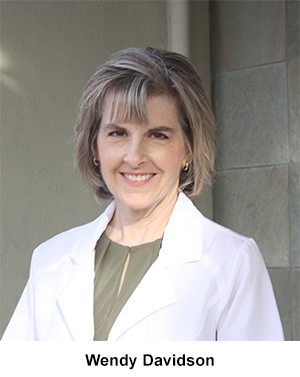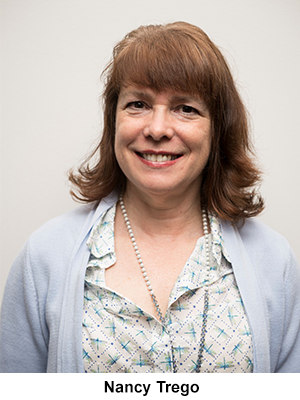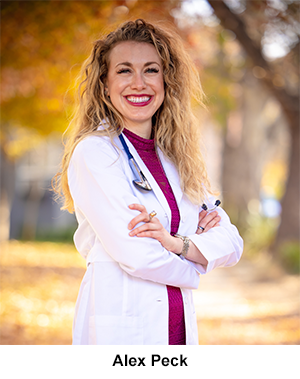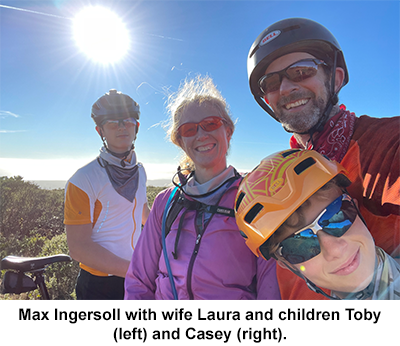By Dorsey Griffith
Contributing Writer
The end of what has been, by any measure, an extraordinary year is a good time to reflect. For CANP, with its historic 2020 legislative victory in the passage of AB 890, the story is one of perseverance in the face of longstanding, powerful opposition and a global pandemic that crippled the State Legislature. It is also one of anticipation for the implementation of the law to allow NPs to practice to the full extent of their expertise and training.
For many California NPs, the year strengthened the calling to get care to those most in need as infections and deaths from COVID-19 mounted, leaving families in grief and, for many, emotional and economic distress. Resilience under the weight of extraordinary pressures in both their professional and personal lives paved the way for a renewed sense of purpose and determination among many California NPs. These are four of their stories.
Wendy Davidson, FNP

Wendy Davidson, a Los Angeles based FNP, was working in a clinic serving medically underserved patients in the San Fernando Valley when the pandemic hit. Her patients were mostly marginalized Latino immigrants, many of them undocumented, living in multi-generational homes and with chronic conditions such as obesity, diabetes, and hypertension.
“It was scary, but our clinic did a good job of getting mobilized with masks and PPE,” she said. “We were afraid for our health, the patients’ health, and our families’ health.”
Davidson already was doing the essential work of a provider during the pandemic, but when Gov. Newsom called for volunteers to work specifically with COVID-19 patients, she applied to join a California Medical Assistance Team (CAL-MAT) through the state Emergency Medical Services Authority.
Her family was concerned.
“My siblings, daughters, and mother said, ‘Why are you doing this? Don’t do it.’” she said. “They tried to talk me out of it. My mom said, ‘I don’t want to bury a child.’”
But Davidson was determined, and with just a few days’ notice was asked to go to a makeshift COVID-19 surge hospital set up in the former Fairview Developmental Center in Orange County. It was late April, and for the next two and half months she worked providing care to patients transferred out of overwhelmed acute care hospitals who no longer needed ventilators, were predicted to recover, but were not well enough to be discharged.
She worked side by side with paramedics, EMTs, PAs, physicians and nurses, some of them members of the U.S. Public Health Service Commissioned Corps, an elite public health team flown in to help.
Her job was to admit and discharge patients, order medications, do physical exams, monitor chronic conditions, review labs and generally provide moral support to patients, many of whom were inner-city Latinos without resources or even homes to which they could return.
The work, she said, fulfilled her.
“It gave me greater professional confidence and added a tremendous sense of meaning to my life,” she said. “One day I can tell my grandchildren this is what I did during the pandemic —even the little I could do to help.”
Now back home and working in an urgent care center, Davidson said she hopes to do another tour of duty with CAL-MAT someday, and urges other NPs to do one, as well.
Nancy Trego, GNP

Nancy Trego has worked 25 years in geriatrics, a field she laments is not particularly popular for health and medical providers.
But today, when 40 percent of the nation’s COVID-19 deaths are occurring in residential facilities, her role could not be more important. She has become a lifeline for patients in nursing homes and other facilities, and their agonized families. The work is both life-giving and draining, so finding peace and a sense of renewal is essential.
Every day, Trego visits several facilities in Napa and Solano counties. Covered in full PPE – mask, face shield, gown, gloves and scrubs, she talks with nurses on staff to find out who is sick and needs to be seen.
“They are suffering now with loneliness and depression and anxiety,” she said of her patients. “We protect them from the virus, but in that process, we have taken away their family visits, the chaplains, beauticians, and activities directors. The social workers don’t go in, so their care is very barebones.”
Trego helps facilitate family connections through the use of Facetime, or through facility windows, where spouses, siblings, and children can see, but not touch their frail loved one.
“When patients are getting close to death and dying, we try to make special arrangements for family and bereavement for some hand-holding.”
Perhaps her greatest contribution to patients at this moment is toenail trimming with what she terms her “polished podiatry skills.”
“My patients can’t do it anymore, but their toenails are thick and tough, and nurses can’t do it because they are afraid of causing an infection. Patients are so happy; some of them tell me they just want to sing and dance.”
Trego believes that in times like these, the nursing profession needs to step up and into the thick of it.
“It’s what we’re trained for,” she said. “There are a lot of conflicting anxieties, but we have learned to put that aside and really charge forward for the patients.”
Of course, Trego needs regular recharging, and she turns to the yoga mat or her bicycle for that.
“I don’t have to wear a mask on the bike, and I feel completely free. I let my mind wander. I sing songs to myself. I think of poems or prayers and write letters in my imagination. I tap into my spiritual side for strength and courage.”
Alex (Malliaris) Peck, FNP-C, MSHCA, MSN

Alex (Malliaris) Peck was working in an aesthetic practice in Oakland caring for transgender people “to help them look on the exterior the way they felt genuinely on the interior” when her mother died. Two months later, the pandemic struck, her clinic closed, and Peck, who was 33 and divorced, was jobless.
“Every time I suffer a loss, I want to take all my feelings and turn them into service,” said Peck, who had lost her father in 2010. “I have a lot of grief. I don’t want to wallow in it.”
Peck wasn’t idle for long. Her brother, an emergency physician who had been a green beret and medic in the U.S. Army, invited her to serve with a group of Special Forces at a COVID-19 step-down unit in New York City. She relished the opportunity.
“These were the sickest of the sick,” she said of the patients, often suffering from delirium, loss of mobility, and other consequences of both the virus and its treatment.
During her intensive, two-week effort in New York City, Peck spent a lot of time trying to connect patients with their families virtually, ensuring that they felt engaged in the care of their loved ones.
“We are all in this together,” she said. “Just because we have all these technological, physical, and legal boundaries around us does not remove the responsibility we have to connect with people. Even if all they see is my eyes behind a steamy shield, I want them to see love, kindness, and compassion.”
In July, Peck embarked on another mission, becoming part of the nation’s first year-long NP residency program at the Betty Irene Moore School of Nursing at UC Davis Health that is supported with a grant from the federal government. There she joined 10 other NPs in a program that places residents in federally qualified health centers.
Peck landed at a West Sacramento clinic that provides integrated care for a high-needs population. She enjoys the mentoring she receives and being part of a team. She doesn’t know what comes in June when her residency ends.
“I’m hoping the path will reveal itself,” she said. “I am going to say yes to everything that comes my way in keeping with my personality and calling. My life is very abundant and joyous as a result.”
Max Ingersoll, FNP

Max Ingersoll knows that not everyone in health care is feeling resilient, especially now with the resurgence of the virus, which is straining a workforce already stretched to its limits.
“Everybody is at the edge right now,” said Ingersoll, who works for Sutter Health in Albany. “If you are holding on it’s by the thinnest straps. It doesn’t take much for a person to go from control and compassion to lashing out and behaving in ways they don’t want to.”
Fortunately, Ingersoll had practiced mindfulness for years before COVID-19 struck. The intentional practice of taking a few moments every day to focus on breathing, to reflect, has been critical to reducing stress so that he can be an effective and kind provider, both for his patients and his family.
“2020 changed everything,” he said. “What we did as a hobby turned into a mainstay of practice and being able to ride the waves instead of being crushed by them.”
With his children, ages 6 and 14, that means not freaking out when one of them makes a poor decision, and instead saying to them, “Tell me more.”
At night, when he is being kept awake worried about his kids’ online schooling or the demands of his job, he does a “body scan meditation” focusing on relaxing each part of his body, slowly and one at a time. The exercise eases him back to sleep every time.
Ingersoll uses similar techniques in his clinic before seeing each patient.
“When I put my hand on the door handle, I concentrate on the coolness of the metal, freeing my mind of my last visit, and breathe so I can focus entirely on who is before me.”
And what had been a limited mindfulness practice among colleagues at the start of periodic meetings—five minutes of breathing and gratitude meditations—is now taking place site-wide, he said, an indication of the immediate need to quell fear and reduce stress.
Ingersoll, a mountain biking enthusiast, likes to think about 2020 as a grueling slog up a steep hill.
“It’s like you can’t see the top and you just plug along knowing there will be a top, and a downhill, and that it can be fun in both directions,” he said. “Instead of looking at how hard things are now, I like to think about how good things will be because of the efforts we put in.”